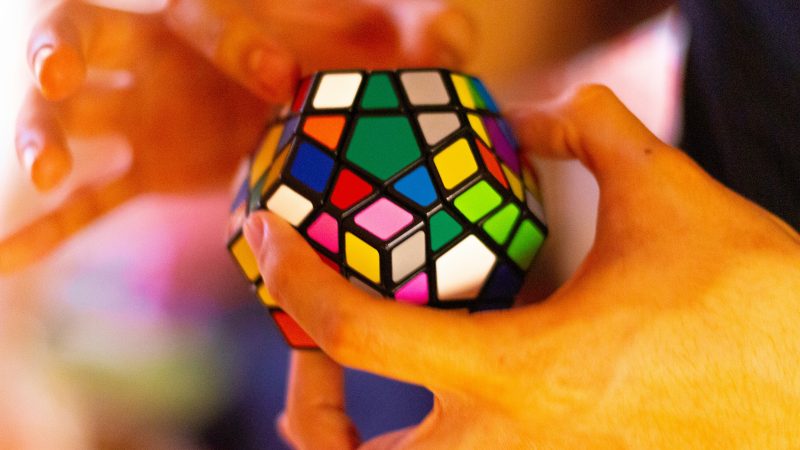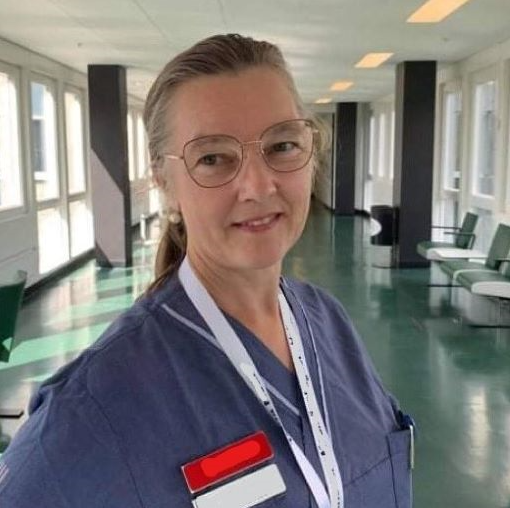
A Lifelong Curiosity
The Career of Virginija Danylaité Karrenbauer – A Journey Blending Clinical Excellence and Research Innovation
From an early age, Virginija Danylaité Karrenbauer was drawn to medicine. “Žingeidumas”, “nyfikenhet” she says, using the Lithuanian and Swedish words for curiosity. This innate drive to learn led her from her childhood dream of becoming a doctor to an international career spanning clinical practice, research, and academia. Today, as a senior consultant neurologist and researcher, she continues to push boundaries in the field of neuroinflammation and neurodegeneration.
The Path to Sweden: Seizing Opportunities

(private photo)
Virginija’s journey from Lithuania to Sweden was fueled by an eagerness to explore new opportunities. While studying medicine at Vilnius University, she came across an advertisement for a Master’s program at Kalmar Högskola (now Linnaeus University). This program, “Environmental protection and physical planning around the Baltics”, led her to Sweden in 1993.
Her thirst for knowledge didn’t stop there. A subsequent internship at the Swedish Institute of Infectious Disease Control introduced her to molecular laboratory techniques. However, she soon realized she needed a greater challenge. Encouraged by her supervisor, she transferred to Karolinska Institutet as an international exchange student to complete her medical studies, later complementing her education with pharmacology courses.
After graduating in medicine at Vilnius University, Virginija returned to Karolinska Institutet to join Professor Anita Aperia’s research group, focusing on hypertension and ion channels. Anita, a pivotal mentor, encouraged her to pursue both clinical and academic careers, recognizing the benefits of a dual path. Virginija took her advice, navigating the complex process of obtaining a Swedish medical license while simultaneously gaining clinical experience and engaging in research.
Balancing Clinical Work and Research
Virginija’s career has been a balancing act between patient care and scientific inquiry. She completed her residency at Norrtälje Hospital, obtaining her Swedish medical license in 2000. In 2002, she joined Karolinska’s neurology clinic, where she has remained for over two decades, specializing in neuroinflammatory diseases, multiple sclerosis (MS), neuroimmunology, and rare neurological diseases.
Her PhD, defended in 2012, focused on inflammatory markers and neurodegeneration in MS. “Science and clinical work go hand in hand,” she says. “Without patients, my work wouldn’t be relevant. Clinical experience sharpens my scientific questions, and research deepens my understanding of disease pathogenesis and drug action mechanisms.”
This philosophy has guided her work, including leading clinical trials for MS patients and directing the Clinical Research Unit at the Department of Neurology, Karolinska University Hospital.
One of her most significant contributions is in the study of rare neurodegenerative diseases, in particular with the rare and lethal disease CRL that affects the brain. CRL stands for CSF1R-related leukoencephalopathy, CSF1R for Colony stimulating factor 1 receptor. And this is where Virginija comes in, studying CSF1R and mutations leading to disease development and progression.
Currently, there is no treatment to stop the disease progression.
She has established international collaborations, connecting with experts at Albert Einstein College of Medicine in New York and the Mayo Clinic in the USA to understand better the pathogenesis of disease and to discuss treatment options.
“I believe in reaching out. If my patients need expertise beyond my own, I will find the people who can help. It is a privilege to have world-renowned experts on specific rare diseases to visit our clinic for a grand round and second opinion on disease management during the KI-Mayo mini-symposium on CSF1R-related leukoencephalopathy”. Next international Mini symposium on CSF1R-related leukoencephalopathy is planned summer 2026 at Karolinska Institutet, were expert around the world will be invited to share the insights on this topic.
Challenges and Triumphs
Balancing a clinical and research career is not easy.
“You need to be sociable, stubborn, and task-oriented and to comply with the regulatory framework to navigate this world,” Virginija admits.
She also highlights the logistical challenges of running clinical trials and securing funding. Over the years, she has become adept at contract writing and negotiating with sponsors, ensuring the best treatments for her patients and the best working conditions for her team.
Virginija is also a dedicated mentor, teaching medical and research students at all education levels. She leads the course for final-year medical students at Karolinska “Neuroinflammatory Diseases With Focus on MS and Neuroimmunology”.
“Sharing knowledge is incredibly fulfilling. I am lucky to work in the clinic where my research and teaching are valued.”
Looking Ahead
Despite her many achievements, Virginija continues to look forward. In 2024, she became a senior consultant neurologist, a significant milestone in her career. She has also been chosen as a coordinator for a national clinical study and is currently preparing her application for a docent (associate professor) position. One of her main scientific goals is to pioneer new insights into cellular senescence using metallomics mapping. “I want to leave behind a new way of understanding CSF1R receptor function and its role in the senescence of innate immunity and neurodegeneration.”
Her advice to early-career researchers?
“Network! Be social, seek multiple mentors, present your work in different meetings and always work with integrity. Science must be honest and transparent.”
Life Beyond Work
Outside of her career, Virginija finds balance through physical activity. A former member of the Stockholm City Triathlon Club, she still trains on her own and competes in yearly Stockholm triathlon competitions. Yearly “Tjejmilen” – a popular 10km race for women is obligatory too to participate with the friends.
“Sports are vital for my resilience, in the long run, to handle the complexity of clinical neurologist assignments and combine with the research tasks. It helps me to keep a clear mind.”
Reflecting on her journey, she acknowledges that career paths are rarely linear.
“In the beginning of my carrier path I had a very clear timeline for reaching career milestones. Obtaining new roles in life like being a dedicated parent or engaging in politics reduces the velocity to reaching career milestones. In life I’ve learned to make quick decisions (if needed) and move forward without self-doubt.”
Sweden has influenced her deeply.
“Here, if you can conceive it, you can achieve it.”
With that mindset, Virginija Danylaité Karrenbauer continues to advance medical science, ensuring better treatments for patients while inspiring the next generation of clinical researchers.
Written by Austeja Baleviciute, PhD student at Karolinska Institutet and participant in the course “Career Skills for Scientists” during the spring term 2025.


0 comments